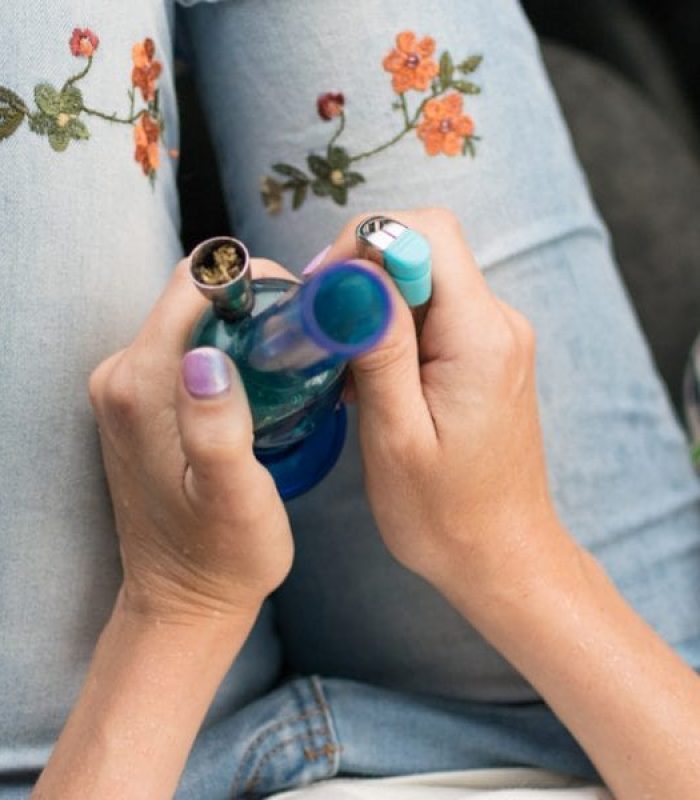We caught up with French beekeeper, Nicholas Trainer, to find out more about the claims he has trained bees to make THC honey from resin. The verdict? It’s definitely possible.
A few years ago, NowThisWeed caused a ruckus by posting a video about a man named Nicolas Trainerbees and his “cannahoney,” a THC honey made from cannabis (as in bees that collected the resin and make cannabis honey). In three years the video scored 24 million views and nearly half a million shares on Facebook alone.

Nicholas Trainerbees, “I have trained bees to do several things, such as collect sugar from fruit, instead of flowers.”
As it goes with internet culture, as soon as the video hit the web, beekeepers, horticulturalists, pot growers, and armchair academics the world over criticized the video for its supposedly inaccurate claim that honey can be made from cannabis.
Why the criticism? Bees produce honey by gathering nectar from flowers. Nectar, a sugary juice that attracts pollinating insects like bees, gets processed in a beehive to become the honey we buy in jars.

Image credit: weter78
Unfortunately, cannabis flowers don’t produce nectar, hence the criticism that cannabis honey is impossible to make. Furthermore, the cannahoney you see on most dispensary shelves comes from infusing the honey with THC distillate after the beekeeper removes the honey from the hive. The bees don’t put the THC in there; humans do.
So, the question remains: has Trainerbees figured out a way to make true cannahoney, or is it a bogus publicity stunt? I’ll go over each critique one-by-one, but before I begin, I will fully disclose that I’ve never tried his cannabis honey, nor have I been to his home where he manages dozens of beehives.
All I’m doing is offering possible explanations for his claims.

Image credit: Oksana Shufrych
Criticism #1: His Name is Fake
 Nicolas Trainer a.k.a. Nicolas Trainerbees is a beekeeper based in Spain. He rarely does interviews because English isn’t his first language. French is.
Nicolas Trainer a.k.a. Nicolas Trainerbees is a beekeeper based in Spain. He rarely does interviews because English isn’t his first language. French is.
However, after I got a hold of Nicolas, he agreed to answer questions through Facebook and e-mail. His responses required editing for clarity. When I asked if “Nicolas Trainerbees” was his real name, he replied:
“Of course not. It’s after people saw what I was doing with the bees, and they started calling me ‘The Bee Trainer,’ that I chose the nickname ‘Trainerbees.’”
Well. Now, with that out of the way….

Image credit: Filip Jedraszak
Criticism #2: It’s a Publicity Stunt
 If Trainerbees’ cannabis honey is totally bunk, then it must be a publicity stunt for money, right? If this is the case, then Nicolas is just another snake oil salesman exploiting the current-day cannabis craze for a quick buck.
If Trainerbees’ cannabis honey is totally bunk, then it must be a publicity stunt for money, right? If this is the case, then Nicolas is just another snake oil salesman exploiting the current-day cannabis craze for a quick buck.
The thing is, you can’t buy Trainerbees’ honey. No one can. It’s not for sale. He makes it for himself, as a hobby and as a medicine, though he mentioned that he sometimes donates it.

Image Credit: Unknown
“I do not sell cannahoney because it’s unprofitable,” he explained, “but I always have a pot to taste, or I give it to the people at events who deserve it.”
For references, Trainerbees wrote that he’s given some of his cannahoney to cannabis activist and entrepreneur Marc Emery, Pot TV’s Al the Alchemist, and Dabstar’s Jonah Sandford.
Criticism #3: Cannabis Doesn’t Produce Nectar
 As any amateur melittologist will tell you, bees don’t produce honey from pollen. Bees produce it from nectar. And as I noted above, female cannabis flowers don’t produce nectar. So where in the heck does Trainerbees get the THC?
As any amateur melittologist will tell you, bees don’t produce honey from pollen. Bees produce it from nectar. And as I noted above, female cannabis flowers don’t produce nectar. So where in the heck does Trainerbees get the THC?

Bee training on resin via @nicholastrainerbee
“I managed to select a very propolis-producing bee” subspecies, he wrote, “and directed them to recover the cannabis resin that they use as propolis. The bees tear off the resin (and sometimes even the ends of the leaves).”
In other words, he gets the bees to collect cannabis resin from cannabis flowers, then the bees process the resin into propolis. What is propolis? Propolis is a waxy substance bees make from various resins, waxes, and oils they collect while gathering nectar. Bees use propolis to seal off parts of the hive, kind of like a bee brand of cement. Bee propolis is receiving lot of attention lately as a health food supplement because it confers a ton of biological benefits.

Image credit: kosolovskyy
Trainerbees wouldn’t share his exact process for getting the bees to collect cannabis resin for propolis. However, one Facebook page, Ethnobeeology, shared a video from Trainerbees showing bees on a cannabis plant. Ethnobeeology commented under this video post, suggesting that “sprayed sugar water” – a common method beekeepers employ to get bees to collect pollen from nectarless plants – could have been one way he directed his bees to strip THC-laden resin from weed.



Image credit: Jurga Jot
Criticism #4: THC Requires Heat to Activate
It’s true that THC needs to be decarboxylated before it can get anyone high. Although heat is the simplest and easiest method to decarb THC, it’s not the only way. For instance, closed-loop super-critical CO2 extraction decarbs THC at extremely low temperatures, far below freezing point. Hydrocarbon extractions (shatter, wax, etc.) can also decarb THC without heat.
However, according to Trainerbees, heat is used to decarb the THC in his bees’ “cannapropolis.” The heat source is the hive itself, which stays at a constant 38°C.
I couldn’t get a melittologist to speak with me about Trainerbees’ claims, so I looked it up myself.

Image credit: Panda Vector
Most bee species maintain incredibly stable temperatures within their hives, usually between 34-36°C, although that can vary by a couple degrees in either direction. For Americans, that’s roughly 93-97°F. Which is fairly hot, even by Arizona’s standards.
But isn’t the magic temperature to decarb THC around 220-235°F? It is, if you’re trying to decarb instantaneously. If it’s given enough time, THC can decarboxylate under a relatively wide range of temperatures.
What Science Says About This Claim
A German study — published by The European Industrial Hemp Association (2016) — looked at the conversion of THC-a to THC under various temperatures. At 95°F, THC-a will decarboxylate after four hours. Trainerbees wrote that he gives his bees about three weeks to “harvest” the cannapropolis within the hive, which is more than enough time to decarb THC at 95°F, even if the cannapropolis contains waxes from other trees or flowers.

Image credit: PopFoto
How does the THC transfer from the cannapropolis to the cannahoney? Again, Trainerbees wouldn’t divulge all his secrets, but this one has an incredibly simple explanation: he mixes the propolis with the honey. Propolis honey has become a hot commodity among the health-conscious. If Trainerbees’ propolis contains naturally heat-activated THC, then combining it with honey shouldn’t be a controversial claim.
Given that, how strong is this stuff? Trainerbees wrote that his cannapropolis is about twenty percent THC, whereas the final cannahoney product is just 0.3 to 1 percent THC. Not exactly a knock-out dose, but several spoonfuls should be enough to get anyone buzzed, excuse the pun.

Image credit: masik0553
Is This the Real Deal?
To reiterate, I’ve never sampled Trainerbees’ THC honey. I haven’t seen his operation. I haven’t seen lab data for his product or for the bees’ propolis. Based on what he told me, and what I could dig up from published scientific literature, his claims aren’t that far-fetched.
I also don’t want you to think I’m slamming all the random Facebook commenters, either. Most of those posts were made a couple of years ago, and the public’s understanding of cannabis chemistry is probably a lot better since then.
Eh.

Image Credit: via dankr.ca
In fact, I sympathize with many of the commenters. There’ve been so many swindlers in the cannabis industry, some of us are practically suffering from scam-induced PTSD. It’s healthy to remain skeptical. It’s normal to ask questions. But let’s give everyone the benefit of a doubt, and give them a chance to defend themselves before dogpiling on them, eh?
As to whether this is true cannahoney or just another infusion (albeit an incredibly clever one), I won’t touch that. Mostly because I don’t care: THC in honey is THC in honey regardless of where it came from, as far as I’m concerned.



